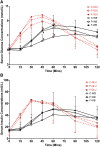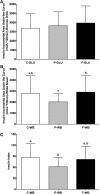Effect of prior meal macronutrient composition on postprandial glycemic responses and glycemic index and glycemic load value determinations
- PMID: 28903959
- PMCID: PMC5657290
- DOI: 10.3945/ajcn.117.162727
Effect of prior meal macronutrient composition on postprandial glycemic responses and glycemic index and glycemic load value determinations
Abstract
Background: The potential impact of prior meal composition on the postprandial glycemic response and glycemic index (GI) and glycemic load (GL) value determinations remains unclear.Objective: We determined the effect of meals that varied in macronutrient composition on the glycemic response and determination of GI and GL values of a subsequent standard test food.Design: Twenty healthy participants underwent 6 test sessions within 12 wk. The subjects received each of 3 isocaloric breakfast meals (i.e., high carbohydrate, high fat, or high protein) on separate days in a random order, which was followed by a standard set of challenges (i.e., white bread and a glucose drink) that were tested on separate days in a random order 4 h thereafter. Each challenge provided 50 g available carbohydrate. Arterialized venous blood was sampled throughout the 2-h postchallenge period. GI, GL, and insulin index (II) values were calculated with the use of the incremental area under the curve (AUCi) method, and serum lipids were determined with the use of standard assays.Results: The consumption of the high-protein breakfast before the white-bread challenge attenuated the rise in the postprandial serum glucose response (P < 0.0001) and resulted in lower glucose AUCi (P < 0.0001), GI (P = 0.0096), and GL (P = 0.0101) values than did the high-carbohydrate and high-fat breakfasts. The high-protein breakfast resulted in a lower insulin AUCi (P = 0.0146) for white bread than did the high-fat breakfast and a lower II value (P = 0.0285) than did the high-carbohydrate breakfast. The 3 breakfasts resulted in similar serum lipid responses to the white-bread challenge.Conclusions: These data indicate that the macronutrient composition of the prior meal influences the glycemic response and the determination of GI and GL values for white bread. Future studies are needed to determine whether the background food macronutrient composition influences mean dietary GI and GL values that are calculated for eating patterns, which may alter the interpretation of the associations between these values and chronic disease risk. This trial was registered at clinicaltrials.gov as NCT01023646.
Keywords: glycemic index and glycemic load; glycemic response; healthy participants; macronutrient composition; nonesterified fatty acids.
© 2017 American Society for Nutrition.
Figures




Comment in
-
Glycemic response and the glycemic index of foods: more remains to be seen on the second-meal effect of proteins.Am J Clin Nutr. 2018 May 1;107(5):845-850. doi: 10.1093/ajcn/nqy030. Am J Clin Nutr. 2018. PMID: 29722839 No abstract available.
-
Reply to Brighenti F et al.Am J Clin Nutr. 2018 May 1;107(5):846-847. doi: 10.1093/ajcn/nqy031. Am J Clin Nutr. 2018. PMID: 29722840 Free PMC article. No abstract available.
Similar articles
-
Effect of macronutrients and fiber on postprandial glycemic responses and meal glycemic index and glycemic load value determinations.Am J Clin Nutr. 2017 Apr;105(4):842-853. doi: 10.3945/ajcn.116.144162. Epub 2017 Feb 15. Am J Clin Nutr. 2017. PMID: 28202475 Free PMC article. Clinical Trial.
-
Postprandial lipid responses to standard carbohydrates used to determine glycaemic index values.Br J Nutr. 2013 Nov;110(10):1782-8. doi: 10.1017/S000711451300130X. Epub 2013 May 9. Br J Nutr. 2013. PMID: 23656707 Free PMC article. Clinical Trial.
-
Effects of breakfast meal composition on second meal metabolic responses in adults with Type 2 diabetes mellitus.Eur J Clin Nutr. 2006 Sep;60(9):1122-9. doi: 10.1038/sj.ejcn.1602427. Epub 2006 May 3. Eur J Clin Nutr. 2006. PMID: 16670695 Clinical Trial.
-
Lowering breakfast glycemic index and glycemic load attenuates postprandial glycemic response: A systematically searched meta-analysis of randomized controlled trials.Nutrition. 2020 Mar;71:110634. doi: 10.1016/j.nut.2019.110634. Epub 2019 Nov 1. Nutrition. 2020. PMID: 31838460
-
Glycemic index and glycemic load: measurement issues and their effect on diet-disease relationships.Eur J Clin Nutr. 2007 Dec;61 Suppl 1:S122-31. doi: 10.1038/sj.ejcn.1602942. Eur J Clin Nutr. 2007. PMID: 17992183 Review.
Cited by
-
Effect of lunch with different calorie and nutrient balances on dinner-induced postprandial glucose variability.Nutr Metab (Lond). 2022 Sep 24;19(1):65. doi: 10.1186/s12986-022-00704-1. Nutr Metab (Lond). 2022. PMID: 36153548 Free PMC article.
-
The Effects of Postprandial Walking on the Glucose Response after Meals with Different Characteristics.Nutrients. 2022 Mar 4;14(5):1080. doi: 10.3390/nu14051080. Nutrients. 2022. PMID: 35268055 Free PMC article.
-
Circadian Deregulation: Back Facing the Sun Toward Metabolic Dysfunction-Associated Steatotic Liver Disease (MASLD) Development.Nutrients. 2024 Dec 12;16(24):4294. doi: 10.3390/nu16244294. Nutrients. 2024. PMID: 39770915 Free PMC article. Review.
-
Trajectory Patterns of Macronutrient Intake and Their Associations with Obesity, Diabetes, and All-Cause Mortality: A Longitudinal Analysis over 25 Years.Nutrients. 2024 Aug 5;16(15):2567. doi: 10.3390/nu16152567. Nutrients. 2024. PMID: 39125446 Free PMC article.
-
Dietary protein intake and obesity-associated cardiometabolic function.Curr Opin Clin Nutr Metab Care. 2020 Nov;23(6):380-386. doi: 10.1097/MCO.0000000000000689. Curr Opin Clin Nutr Metab Care. 2020. PMID: 32868684 Free PMC article. Review.
References
-
- Liu S, Willett WC, Stampfer MJ, Hu FB, Franz M, Sampson L, Hennekens CH, Manson JE. A prospective study of dietary glycemic load, carbohydrate intake, and risk of coronary heart disease in US women. Am J Clin Nutr 2000;71:1455–61. - PubMed
-
- Barclay AW, Petocz P, McMillan-Price J, Flood VM, Prvan T, Mitchell P, Brand-Miller JC. Glycemic index, glycemic load, and chronic disease risk–a meta-analysis of observational studies. Am J Clin Nutr 2008;87:627–37. - PubMed
-
- Jenkins DJ, Kendall CW, Vuksan V, Faulkner D, Augustin LS, Mitchell S, Ireland C, Srichaikul K, Mirrahimi A, Chiavaroli L, et al. . Effect of lowering the glycemic load with canola oil on glycemic control and cardiovascular risk factors: a randomized controlled trial. Diabetes Care 2014;37:1806–14. - PubMed
-
- Salmerón J, Ascherio A, Rimm EB, Colditz GA, Spiegelman D, Jenkins DJ, Stampfer MJ, Wing AL, Willett WC. Dietary fiber, glycemic load, and risk of NIDDM in men. Diabetes Care 1997;20:545–50. - PubMed
-
- Salmerón J, Manson JE, Stampfer MJ, Colditz GA, Wing AL, Willett WC. Dietary fiber, glycemic load, and risk of non-insulin-dependent diabetes mellitus in women. JAMA 1997;277:472–7. - PubMed
Publication types
MeSH terms
Substances
Associated data
LinkOut - more resources
Full Text Sources
Other Literature Sources
Medical

